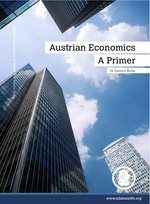PoliticsHome have published an email exchange between Steve Baker and Austin Mitchell, Labour MP for Great Grimsby:
The controversial strategy of increasing the money supply by ‘quantitative easing’ (QE) is being applied both here and abroad in a bid to stimulate stagnant economies. But aside from the practical question of whether QE works, Steve Baker MP and Austin Mitchell MP disagree about its moral and social consequences
Steve opens as follows:
I have always wondered why anyone on the left would support quantitative easing (QE), which is an obvious wealth transfer from the poor to the rich, and one bound to store up problems for the future. Public debate focuses on aggregates like the total money supply but new money always goes to someone first, giving them a purchasing power advantage. QE is bound to benefit those who receive new money from the Bank of England.
The entire dialogue is well worth reading in full.



Yes QE, indeed monetary expansion generally, tends to transfer resources from the poor to the rich.
It is no accident that high inflation economies (such as those of most of Latin America) also tend to be places of extreme inequality.
Credit-money bubble economics is having a similar effect in the United States – an effect that fools (and worse than fools) blame on “low taxes on the rich” (in reality about half the American population do not pay much if any Federal income tax – and it is not the richer half who do not pay).
There is no excuse for economist to pretend they do not know what expansionary monetary policies do in terms of increasing inequality to an extreme level.
After all the non neutral effects of monetary expansion have been written about for centuries – all the way back to Richard Cantillion (John Law’s partner in “legal” crime) back in the 1700s.
Telling that Mitchell doesn’t understand that someone has to save before investment can take place. Demand apparently exists entirely independent of saving, and we can just go on stimulating the economy to our hearts content!